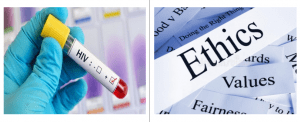Social and Ethical Issues in Working with the HIV Population (3 HR) Syllabus
I. Overview of HIV, HBV, and HCV
- HIV as a lentivirus impacting the immune system and leading to AIDS
- HBV and HCV as liver infections, their transmission and health implications
- Stages of HIV: acute infection, clinical latency, and AIDS
- Key facts: viral load, superinfection, STI co-infections, and testing windows
II. Social and Economic Factors Affecting HIV Risk
- Role of poverty, incarceration, and education levels in HIV prevalence
- Impact of stigma, discrimination, and language barriers
- Housing instability, food insecurity, and urban health disparities
- Challenges faced by women, rural residents, and other marginalized groups
III. Populations Disproportionately Affected by HIV
- African Americans and Latinos: disparities in diagnosis and care
- Men who have sex with men (MSM), especially Black and Latino communities
- Transgender individuals and increased rates of diagnosis
- Heterosexual IV drug users and trends in transmission
IV. Barriers to Diagnosis, Treatment, and Care
- Late testing and lack of awareness among youth
- SES-related access barriers: transportation, healthcare infrastructure, and stigma
- Challenges for homeless and food-insecure individuals in treatment adherence
- Issues around women’s health, prenatal care, and maternal HIV risks
V. Ethical Issues in HIV Research and Testing
- Core ethical principles: autonomy, beneficence, non-maleficence, justice
- Risks in research design: informed consent, coercion, and vulnerable populations
- Conflict of interest and non-publication of unfavorable results
- Ethical management of participant confidentiality and welfare
VI. HIV Criminalization and Disclosure Laws
- NC laws regarding HIV disclosure, control measures, and sexual activity
- Mandatory testing laws and debates over civil rights
- Legal precedents and cases involving non-disclosure
- Confidentiality vs. duty to warn: ethical tensions in clinical settings
VII. Human Rights and Ethical Responsibilities
- Right to non-discrimination, health, life, and employment
- Stigma in healthcare settings and its impact on treatment access
- Ethical care frameworks for supporting dignity and equality
- Advocacy for modernization of HIV-related laws and policies
VIII. Ethical Decision-Making in Clinical Practice
- Case study: The Wayward Husband – balancing beneficence and confidentiality
- Ethical questions around public health vs. individual rights
- Guidelines for assessing harm, identifiability, and intervention necessity
- Use of ethical frameworks to guide disclosure and confidentiality decisions
IX. Client-Centered Strategies and Mobilization
- Engaging clients through education, empowerment, and cultural sensitivity
- Mobilizing communities with shared concerns and collective action
- Role of clinicians in social advocacy and systems change
- Encouraging ethical reflection and ongoing professional development
X. Closing Reflections and Applications
- Personal stories of people living with HIV and the role of clinicians
- Lessons learned from HIV applied to other public health crises
- Final reflections on compassion, justice, and ethical responsibility in care



